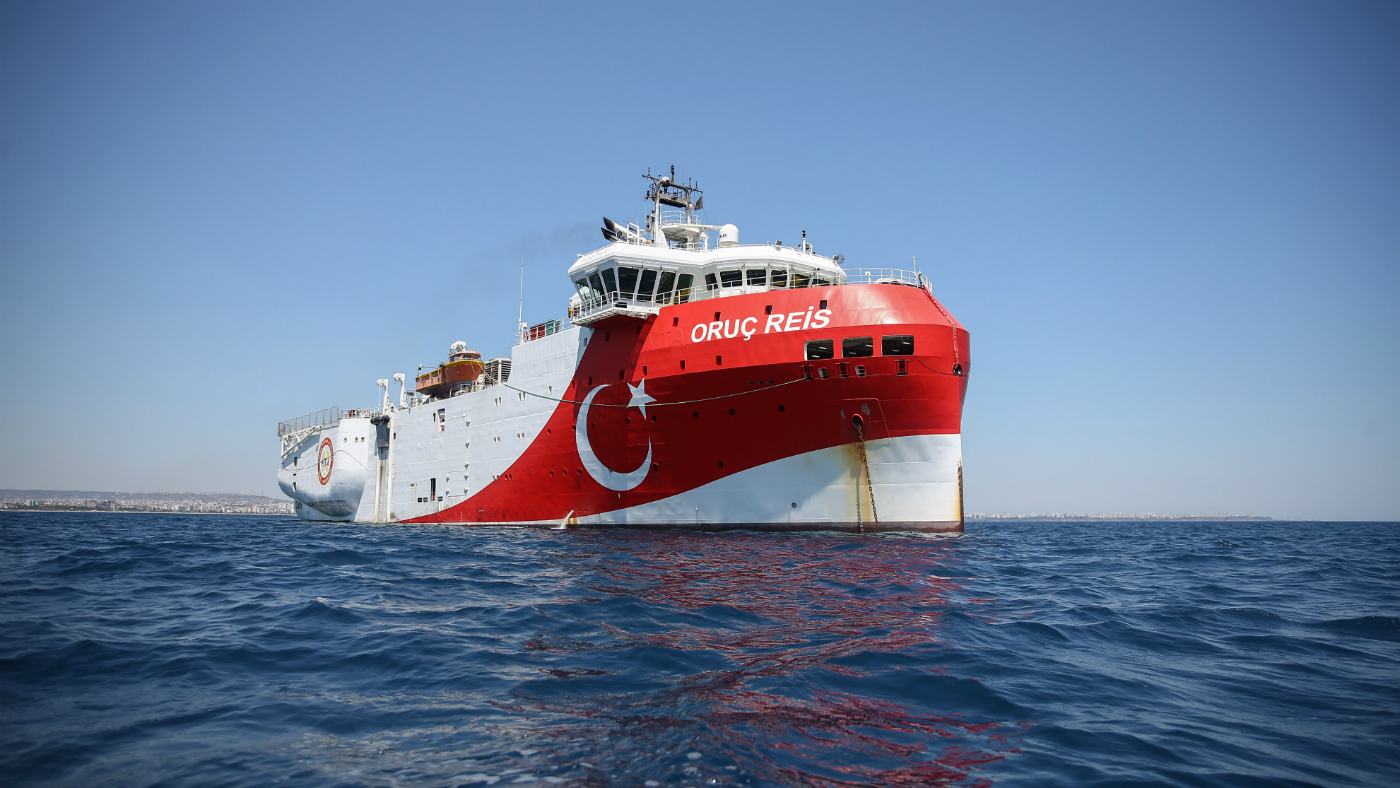France squares up to Turkey in the Mediterranean
Emmanuel Macron to ‘temporarily reinforce’ French military in the region amid escalating row over disputed waters

A free daily email with the biggest news stories of the day – and the best features from TheWeek.com
You are now subscribed
Your newsletter sign-up was successful
President Emmanuel Macron has announced that France’s military presence in the eastern Mediterranean is to be boosted, as tensions escalate between Greece and Turkey over oil and gas exploration in disputed waters.
In a phone call with Greek Prime Minister Kyriakos Mitsotakis last night, Macron voiced concern over what he called “unilateral” exploration by Turkey in the region, Reuters reports. Ankara should “cease” its operations “in order to allow a peaceful dialogue” between the nations, the French leader’s office added in a statement.
Macron has pledged to “temporarily reinforce” the presence of the French military in order to “monitor the situation in the region and mark its determination to uphold international law”.
The Week
Escape your echo chamber. Get the facts behind the news, plus analysis from multiple perspectives.

Sign up for The Week's Free Newsletters
From our morning news briefing to a weekly Good News Newsletter, get the best of The Week delivered directly to your inbox.
From our morning news briefing to a weekly Good News Newsletter, get the best of The Week delivered directly to your inbox.
The move is likely to further sour relations between Paris and Ankara, which came close to breaking point in July when Macron pushed for EU sanctions against Turkey for what he called “violations” of Greek and Cypriot sovereignty over their territorial waters.
What are the allegations against Turkey?
As Al Jazeera reports, fellow Nato members Turkey and Greece “vehemently disagree over overlapping claims to hydrocarbon resources” in the eastern Mediterranean and Aegean Sea, with the two countries holding “conflicting views on the extent of their continental shelves in waters dotted with mostly Greek islands”.
In July, Macron called on the EU to impose sanctions on Ankara after Turkey’s navy began planning seismic surveys in an area of sea between Cyprus and Crete - a move that Greece claimed was part of an attempt to encroach on its continental shelf.
A free daily email with the biggest news stories of the day – and the best features from TheWeek.com
Macron told European leaders that it “not acceptable for the maritime space of a European Union member state to be violated or threatened”.
Despite the threat of sanctions, however, the dispute has escalated “to the brink of conflict” this week, after Ankara dispatched seismic research ship Oruc Reis - accompanied by Turkish naval vessels - to the Greek island of Kastellorizo, says The Times.
How is France responding?
The statement from Macron’s office warned that France is determined “to uphold international law”.
In a Twitter post on Wednesday, the president called the situation “worrying” and urged Turkey to stop its research operations.
“I have decided to temporarily reinforce the French military presence in the eastern Mediterranean in the coming days, in cooperation with European partners, including Greece,” Macron said.
Relations between France and Turkey have grown increasingly strained in recent years. Aside from recent gas disputes, the two countries are at loggerheads over whether Nato allies should respect the UN arms embargo for Libya, where France and Turkey are supporting opposite sides in the conflict.
Macron has also “vowed support” for Kurds in Syria fighting against the Islamic State - an alliance that Turkey believes is tantamount to support for the Kurdistan Workers’ Party, or PKK. Ankara has been waging a bloody and controversial war against the radical Kurdish militant organisation, which is designated as a terrorist group by the US, EU and Turkey.
-
 The ‘ravenous’ demand for Cornish minerals
The ‘ravenous’ demand for Cornish mineralsUnder the Radar Growing need for critical minerals to power tech has intensified ‘appetite’ for lithium, which could be a ‘huge boon’ for local economy
-
 Why are election experts taking Trump’s midterm threats seriously?
Why are election experts taking Trump’s midterm threats seriously?IN THE SPOTLIGHT As the president muses about polling place deployments and a centralized electoral system aimed at one-party control, lawmakers are taking this administration at its word
-
 ‘Restaurateurs have become millionaires’
‘Restaurateurs have become millionaires’Instant Opinion Opinion, comment and editorials of the day
-
 Greenland’s capital becomes ground zero for the country’s diplomatic straits
Greenland’s capital becomes ground zero for the country’s diplomatic straitsIN THE SPOTLIGHT A flurry of new consular activity in Nuuk shows how important Greenland has become to Europeans’ anxiety about American imperialism
-
 Epstein files topple law CEO, roil UK government
Epstein files topple law CEO, roil UK governmentSpeed Read Peter Mandelson, Britain’s former ambassador to the US, is caught up in the scandal
-
 Iran and US prepare to meet after skirmishes
Iran and US prepare to meet after skirmishesSpeed Read The incident comes amid heightened tensions in the Middle East
-
 Israel retrieves final hostage’s body from Gaza
Israel retrieves final hostage’s body from GazaSpeed Read The 24-year-old police officer was killed during the initial Hamas attack
-
 China’s Xi targets top general in growing purge
China’s Xi targets top general in growing purgeSpeed Read Zhang Youxia is being investigated over ‘grave violations’ of the law
-
 Panama and Canada are negotiating over a crucial copper mine
Panama and Canada are negotiating over a crucial copper mineIn the Spotlight Panama is set to make a final decision on the mine this summer
-
 Why Greenland’s natural resources are nearly impossible to mine
Why Greenland’s natural resources are nearly impossible to mineThe Explainer The country’s natural landscape makes the task extremely difficult
-
 Iran cuts internet as protests escalate
Iran cuts internet as protests escalateSpeed Reada Government buildings across the country have been set on fire